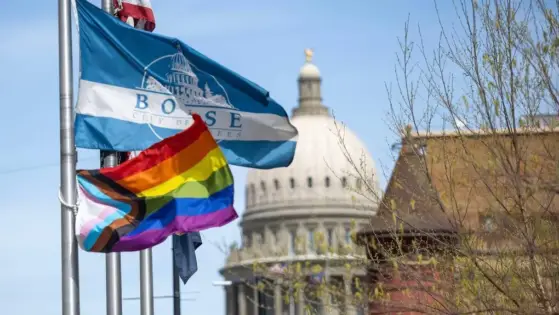 Chalk this one up on the list of Things For The Roberts Court To Overturn:
Chalk this one up on the list of Things For The Roberts Court To Overturn:
SAN FRANCISCO, California (AP) — Reciting the Pledge of Allegiance in public schools was ruled unconstitutional Wednesday by a federal judge who granted legal standing to two families represented by an atheist who lost his previous battle before the U.S. Supreme Court.
U.S. District Judge Lawrence Karlton ruled that the pledge’s reference to one nation “under God” violates school children’s right to be “free from a coercive requirement to affirm God.”
Karlton said he was bound by precedent of the 9th U.S. Circuit Court of Appeals, which in 2002 ruled in favor of Sacramento atheist Michael Newdow that the pledge is unconstitutional when recited in public schools.
Remember that Newdow’s case went to the Supreme court, which was dismissed 8-0 because the court found that Newdow didn’t have legal standing to bring the case:
WASHINGTON (CNN) — The Supreme Court on Monday ruled that a California father could not challenge the Pledge of Allegiance, a decision that sidestepped the broader question of the separation of church and state.
Five justices — led by Justice John Paul Stevens — said Michael Newdow, the father, did not have the legal standing to bring the case. Newdow, who is involved in a custody dispute with the mother of their third-grade daughter, could not speak for the girl, the court ruled.
“When hard questions of domestic relations are sure to affect the outcome, a prudent course is for the federal court to stay its hand rather than reach out to resolve a weighty question of federal constitutional law,” wrote Stevens.
So five of the justices (the “liberal” wing) decided to pass on settling the issue due to a technicality. But that didn’t stop Rehnquist, O’Connor, and Thomas from letting everyone know where they stood (and Scalia had recused himself, at Newdow’s request, because of a speech he’d given earlier that year asserting the same thing):
The justices said the pledge does not violate the First Amendment, which prohibits the establishment of religion by the government.
“To give the parent of such a child a sort of ‘heckler’s veto’ over a patriotic ceremony willingly participated in by other students, simply because the Pledge of Allegiance contains the descriptive phrase ‘under God,’ is an unwarranted extension of the establishment clause, an extension which would have the unfortunate effect of prohibiting a commendable patriotic observance,” Rehnquist wrote.
A “heckler’s veto?” That’s what you call it when someone wants to protect his child’s religious (or areligious) upbringing from a government endorsement of theism? Damn, it’s times like these when I wish I had a kid, whom I would train to yell “WITHOUT DISCRIMINATION” over the top of the “under God” part of his school-recited pledge. Better yet, have him yell “UNDER SATAN” and let’s see just how long this “ceremonial deism” crap will stand. Hey, if it’s only ceremonial, if it’s not an endorsement of religion, it shouldn’t matter which God he pledges to, right? Throw a few “UNDER THOR”s and “UNDER AMUN-RA”s and “UNDER ZEUS”s in there for good measure, kid.
Newdow had declared that his daughter would be singled out if she chose not to say the Pledge of Allegiance, and would be coerced to participate.
“Imagine you’re a third-grader in a class of 30 kids. That’s enormous pressure to put on a child,” he said. “Government needs to stay out of the religion business altogether.”
I don’t have to imagine; I was that third grader. I’ve been an atheist since the age of eight (that’s when I figured out that Santa Claus didn’t exist, either.) And every day, I was forced / coerced to recite a patriotic pledge of love and honor for my country that was directly tied to a religion I didn’t belong to. “We’re ‘one nation, under God’, we’re ‘indivisible’ because of our shared belief in God, ‘with liberty and justice for all’ so long as they let us who believe in God run the show.” Sure, I could have mumbled the “under God” part. Or my parents could’ve excused me from saying the Pledge altogether. Those actions win you lots of friends in the grade schools of the conservative county in conservative Idaho.
The Bush administration opposed the ban, and Solicitor General Theodore Olson told the justices the pledge is simply a “ceremonial, patriotic exercise.”
The pledge was written in 1892 by Baptist minister and educator Francis Bellamy, who made no reference to religion in his version. It was originally worded: “I pledge allegiance to my flag and the republic for which it stands, one nation, indivisible, with liberty and justice for all.” It quickly became a part of public school programs.
In 1954, Congress added the words “under God,” after pressure by the Knights of Columbus and other groups. Another modification was to change “my flag” to “the flag of the United States of America.”
Gee, how on Earth did our Republic manage to stand for 178 years without “under God”?






